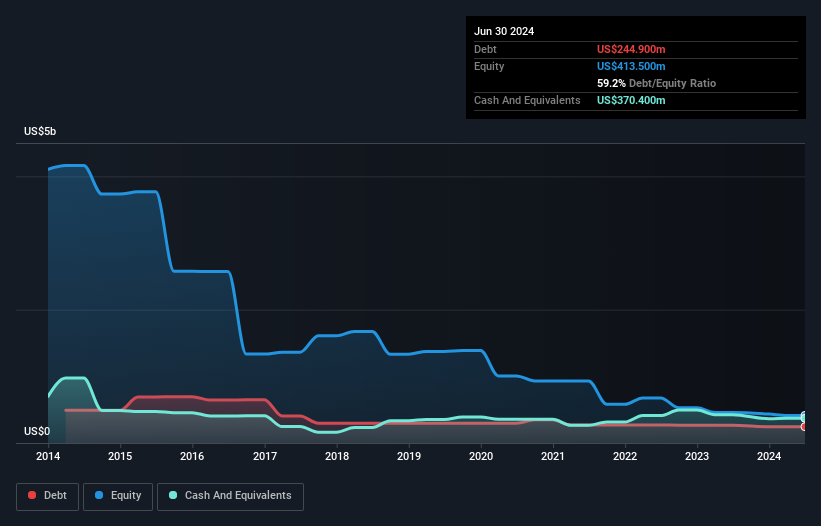
Warren Buffett famously said, 'Volatility is far from synonymous with risk.' It's only natural to consider a company's balance sheet when you examine how risky it is, since debt is often involved when a business collapses. As with many other companies Genel Energy plc (LON:GENL) makes use of debt. But should shareholders be worried about its use of debt?
When Is Debt A Problem?
Generally speaking, debt only becomes a real problem when a company can't easily pay it off, either by raising capital or with its own cash flow. In the worst case scenario, a company can go bankrupt if it cannot pay its creditors. However, a more frequent (but still costly) occurrence is where a company must issue shares at bargain-basement prices, permanently diluting shareholders, just to shore up its balance sheet. Of course, debt can be an important tool in businesses, particularly capital heavy businesses. When we think about a company's use of debt, we first look at cash and debt together.
Check out our latest analysis for Genel Energy
What Is Genel Energy's Net Debt?
As you can see below, Genel Energy had US$244.9m of debt at June 2024, down from US$266.8m a year prior. But on the other hand it also has US$370.4m in cash, leading to a US$125.5m net cash position.

How Healthy Is Genel Energy's Balance Sheet?
According to the last reported balance sheet, Genel Energy had liabilities of US$76.1m due within 12 months, and liabilities of US$298.4m due beyond 12 months. On the other hand, it had cash of US$370.4m and US$30.2m worth of receivables due within a year. So it can boast US$26.1m more liquid assets than total liabilities.
This short term liquidity is a sign that Genel Energy could probably pay off its debt with ease, as its balance sheet is far from stretched. Succinctly put, Genel Energy boasts net cash, so it's fair to say it does not have a heavy debt load! There's no doubt that we learn most about debt from the balance sheet. But ultimately the future profitability of the business will decide if Genel Energy can strengthen its balance sheet over time. So if you're focused on the future you can check out this free report showing analyst profit forecasts.
Over 12 months, Genel Energy made a loss at the EBIT level, and saw its revenue drop to US$74m, which is a fall of 64%. To be frank that doesn't bode well.
So How Risky Is Genel Energy?
We have no doubt that loss making companies are, in general, riskier than profitable ones. And the fact is that over the last twelve months Genel Energy lost money at the earnings before interest and tax (EBIT) line. Indeed, in that time it burnt through US$2.2m of cash and made a loss of US$34m. But the saving grace is the US$125.5m on the balance sheet. That kitty means the company can keep spending for growth for at least two years, at current rates. Overall, its balance sheet doesn't seem overly risky, at the moment, but we're always cautious until we see the positive free cash flow. The balance sheet is clearly the area to focus on when you are analysing debt. However, not all investment risk resides within the balance sheet - far from it. For instance, we've identified 1 warning sign for Genel Energy that you should be aware of.
When all is said and done, sometimes its easier to focus on companies that don't even need debt. Readers can access a list of growth stocks with zero net debt 100% free, right now.
New: Manage All Your Stock Portfolios in One Place
We've created the ultimate portfolio companion for stock investors, and it's free.
• Connect an unlimited number of Portfolios and see your total in one currency
• Be alerted to new Warning Signs or Risks via email or mobile
• Track the Fair Value of your stocks
Have feedback on this article? Concerned about the content? Get in touch with us directly. Alternatively, email editorial-team (at) simplywallst.com.
This article by Simply Wall St is general in nature. We provide commentary based on historical data and analyst forecasts only using an unbiased methodology and our articles are not intended to be financial advice. It does not constitute a recommendation to buy or sell any stock, and does not take account of your objectives, or your financial situation. We aim to bring you long-term focused analysis driven by fundamental data. Note that our analysis may not factor in the latest price-sensitive company announcements or qualitative material. Simply Wall St has no position in any stocks mentioned.
About LSE:GENL
Genel Energy
Operates as an independent oil and gas exploration and production company.
Flawless balance sheet and slightly overvalued.
Similar Companies
Market Insights
Community Narratives



